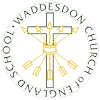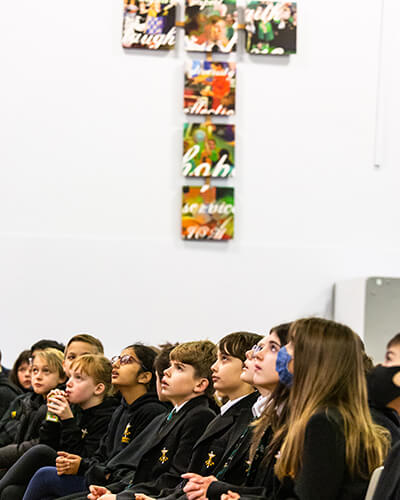
Our daily routines and educational practice are rooted in the twin values of Dignity and Respect.

Who am I? Why am I here? What do I desire? How then shall I live?
The intent of the Religious Studies curriculum at Waddesdon Church of England School aims to ensure that each student achieves his/her potential and develops a profound understanding of religious, moral and spiritual concepts and issues. In line with the Church of England character of the school, the Religious Studies curriculum aims to deepen the students’ understanding of the Christian faith, whilst at the same time providing an open-minded approach to exploring a variety of religious and non-religious worldviews. The current staffing in the department includes a Humanist, a Christian and a Muslim. This pluralism among colleagues reflects life in modern Britain and is modelled to students through staff interactions and in our curriculum intent and implementation.
Learners are encouraged to express both their own ideas and relate the ideas of others to themselves through evaluation. Questioning and debating is commonplace in lessons, with a focus on developing higher order thinking skills and argumentation. Consideration of moral codes is another major theme of the curriculum. Religious Studies plays a major role in contributing to the whole-school expression of an ethos of dignity and respect for all, and an awareness of the spiritual and moral values pertaining to all aspects of life.
Religious Studies form a fundamental part of the broad and balanced curriculum at Waddesdon. Parents (and young people over 18) have a legal right to ask to withdraw (their child) from some or all of this part of the curriculum and are asked to first contact the subject leader, Mrs Khan.
Mrs Muryum KhanSubject Leader for Religious Studies |
Mr John DanganaReligious Studies Teacher |
Mr Mohammed IsrarReligious Studies Teacher |
KS3
KS4
These provide contrasting approaches to questions of meaning and the nature of religion as well as cultural differences. Buddhism engages the interest of students as an alternative approach to the one with which they are more familiar.
KS5
A deepening of the KS4 experience via exploring theological, philosophical and ethical concepts with a focus on Christianity. Students are also required to show how these interact with each other in a form of ‘dialogue’. Themes such as the impact of feminism and atheism on religion are also explored and broaden the scope of the student experience. Further development of higher order thinking skills including evaluation, analysis and argumentation.
The two year Key Stage 3 lays the foundation in the core knowledge and skills students need in order to progress successfully into the Full Course GCSE that all students are entered for. As an Academy the curriculum is informed by the Locally Agreed Syllabus and guidance from the Diocesean Board of Education. The sequencing of the curriculum enables students to build their knowledge in a coherent way and apply it as they progress through the two year course.
Students are taught the following topics in Year 7
Students are taught the following topics in Year 8:
Starting in Year 9 all students follow the AQA A specification and study two religions in depth, Christianity and Buddhism. The selection of the Themes option for the second paper enables students to apply their learning of the religious concepts studied to areas of ethics affecting the world and to help prepare them for life in modern Britain..
The selection of an Abrahamic and a Dharmic (some consider non-theistic) religion is deliberate. These two worldviews provide contrasting approaches to questions of meaning and the nature of religion as well as cultural differences. Buddhism engages the interest of students as an alternative approach to Christianity, which they are more familiar with as the main religious tradition in Britain.
Students are taught the following topics in Years 9 to 11:
All students follow a three-year course leading to a Full Religious Studies GCSE qualification.
Students learn how religion, philosophy and ethics form the basis of our culture, and are challenged with questions about belief, values, meaning, purpose and truth, enabling them to develop their own attitudes towards religious issues. They develop analytical and critical thinking skills, the ability to work with abstract ideas, leadership and research skills. All these skills will help prepare them for further study
They explore the beliefs, teachings and practices of Christianity and Buddhism in detail.
They also study four themes:
A deepening of the KS4 experience via exploring theological, philosophical and ethical concepts with a focus on Christianity. Students are also required to show how these areas interact with each other in a form of ‘dialogue’. Themes such as the impact of feminism and atheism on religion are also explored and broaden the scope of the student experience. Further development of higher order thinking skills including evaluation, analysis and argumentation.
Students are taught the following topics in Years 12 and 13:
The course features a variety of relevant and contemporary themes, to help inspire engaging classroom discussion. Students will also gain critical and evaluative skills sought after by higher education and employers, particularly in law, education, social work, politics, medicine, administration and the media. Religious studies is a thought-provoking subject, and the contemporary themes inspire engaging classroom discussion.
The course consists of:
Philosophy of Religion and Ethics: exploring a range of ethical issues such as medical ethics and animal rights as well as some of the arguments for and against the existence of God
A Study of Christianity: analysing such theological issues as beliefs about life after death, a literal or non-literal approach to the Bible, and what is meant by God.

Waddesdon Church of England School’s Assessment and Feedback Policy. At Waddesdon our aim is for assessment to be:
